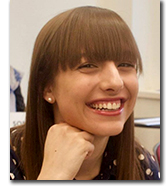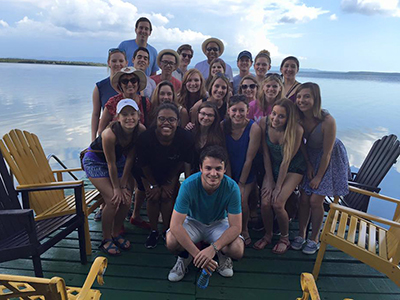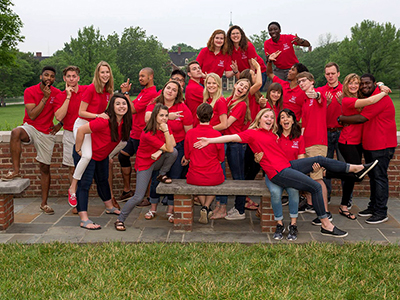
- junior International Studies and Latin American Studies double major
- from Warrenville, IL
- participated in the Cuba in Transition study abroad program (J-Term 2016)
- studied abroad in Buenos Aires, Argentina (Fall 2017)
- volunteered as ESL teacher for Spanish speakers in local community
- Student Orientation Undergraduate Leader (Summer 2017)
- member of the Miami University Model UN organization's secretariat board
"Take advantage of the small class sizes that are offered in most higher level CAS courses. CAS professors are amazing people, and smaller classes give you the chance to make real connections and even friendships with them. Never be afraid to speak up, debate, and ask questions during class — that's how you really start to learn and understand!"
Why Miami?
"As a high school senior, every time I visited Miami's campus, I felt like it could truly become my home. I went to a Make It Miami event in March and was blown away by all of the kind and helpful people I met at that event. Their excitement about Miami made it clear that it would be the right choice for me!
"During my first year at Miami, I made a lot of new friends, found my place on campus, and matured a lot as a person. Academically, I really found my passion through my Latin American Studies (LAS) major during that first year. I originally came in solely as an International Studies major because I wanted to focus on international politics, but my academic advisor encouraged me to add a concentration in Latin America because I also study Spanish. By the end of the year, I had fallen in love with LAS and added it as my second major. My LAS classes are among my favorites because the professors are so passionate and engaging about what they teach.
"I am constantly challenged by different ideas and viewpoints here at Miami. Instead of going to a campus where everyone has similar political beliefs, I like that at Miami I have made close friends who fall in many different points of the political spectrum. This has made me think critically about why I have developed my own political beliefs, question if my own ideas are based on sound principles, and develop more respect for a diversity of ideas."
Best Miami Experiences

The Cuba in Transition study abroad crew poses for a group photo (January 2016).
"Study abroad has been an incredible experience for me. I went to Cuba during January Term 2016 with the Cuba in Transition group, and as a first-year student I loved having real-world experience to back up what I had learned thus far in my classes about Cuba and Latin America as a whole. Last fall I studied abroad in Argentina at Universidad del Salvador in Buenos Aires via ISEP (International Student Exchange Program); it was exciting to try to integrate myself into a new country's culture!
"As a SOUL (Student Orientation Undergraduate Leader) during summer 2017, I helped lead small groups at Miami's summer orientation for first-year students. It was a great experience because I made some incredible new friends, met the next generation of Miami students, and grew as a leader and a person.
"My academic advisor for International Studies is senior lecturer Melanie Ziegler, who has been incredibly helpful and influential throughout my time at Miami so far. I loved getting to have her and senior lecturer Juan Carlos Albarrán as my professors for the Cuba in Transition workshop.
"In addition, associate professor of history Elena Albarrán is my favorite professor in Latin American Studies. She is always passionate, creative, intelligent, and extremely prepared to teach! Charles Stevens, a senior lecturer in International Studies, has also had a huge impact on my college experience ever since I had him as a professor during my first semester. He is always brutally honest and gave me some great advice. Finally, of course, my amazing friends from Miami Model UN and the 2017 SOUL team have been a really positive part of my life as a Miami student!
"My two majors are preparing me to be a critical thinker who approaches problems through several different lenses. International Studies has especially accomplished this because as an interdisciplinary program in the liberal arts, I have had to take courses from different disciplines such as political science, anthropology, economics, and geography. I think that being academically well rounded and familiar with various fields of study will make me prepared for a wider range of career paths and more adaptable when I have to solve difficult problems."
Miami and the Liberal Arts

Miami University Student Orientation Undergraduate Leaders in a lighter moment
"As a liberal arts major I actually get excited about what I'm studying! While something like a business degree can be the right choice for some people because it has a set career path, I think that a liberal arts degree was much better for me because it feeds my passion for international politics and Latin America. Because of my interest in what I am learning now, I will end up in a career that genuinely interests and fulfills me — instead of one that just pays the bills.
"My favorite thing about my majors is that they truly push me to think past what I personally experience in my daily life and focus on how I am part of a much larger global system that influences the politics, economics, and culture that all of us experience. This kind of intercultural and international thinking prepares me for my future because I plan to travel as much as I can, work outside of the United States, and join the Peace Corps when I graduate.
"One course that definitely influenced my life this past year was Latin American Popular Culture (LAS 332), because it completely changed the way I analyze culture and media. The class was organized around the concept of binaries (such as high/low culture or male/female), and we had to analyze and discuss how many cultural products such as food, music, and art do not fit cleanly into such categories. At the end of the course, my professor told the class that her goal was to give us the tools to consume media critically. I definitely think she accomplished that goal because I still think about the concepts we learned in class in my everyday life!"
Tutoring English to Local Spanish Speakers
"Last semester, I volunteered along with other Miami students to teach English as a Second Language (ESL) to members of the Hispanic community at Main Street Schoolhouse, a non-profit private school located in nearby Hamilton. Some of the students who volunteered there were doing it for class credit for a service learning course, but I participated as a volunteer in a 0-credit internship through senior lecturer Katherine Fowler-Cordova in the Department of Spanish & Portuguese.
"People who speak many different languages take English classes at Main Street Schoolhouse, but we were primarily focused on working with Spanish speakers. Our group tutored small groups of adults and teenagers once a week for the full semester, and it was a great experience to get to know some members of the immigrant community and hear about how they came to the United States.
"My time volunteering and teaching English in this program was a great experience for me because it gave me the opportunity to practice my Spanish outside the classroom and develop my ability to teach. Both of these things are really important for my career path, since I want to find a job where I can keep speaking Spanish throughout my life. This skill is also directly related to my plans to work with the Peace Corps."
Advice to Students
"Make sure you always keep enough time in your schedule to have your own life and get a good amount of sleep. Two jobs, 10 activities, and 20 credit hours might look really good on paper, but in reality it'll make you feel super overwhelmed and unable to do your best work on anything. Pick just a couple of things that you love to do, do them well, and don't forget to have fun!
"To de-stress, I love to spend time with close friends and take walks around campus or on the hiking trails. Spending any time outside, such as on Western Campus, always makes me feel better. It's great to lie on the grass by the pond and read a book or take a nap.
"Finally, take advantage of the small class sizes that are offered in most higher level CAS courses. CAS professors are amazing people, and smaller classes give you the chance to make real connections and even friendships with them. Never be afraid to speak up, debate, and ask questions during class — that's how you really start to learn and understand!"
[March 2018]
 Miami University Oxford, Ohio est. 1809
College of Arts and Science
Miami University Oxford, Ohio est. 1809
College of Arts and Science
 Miami University Oxford, Ohio est. 1809
College of Arts and Science
Miami University Oxford, Ohio est. 1809
College of Arts and Science